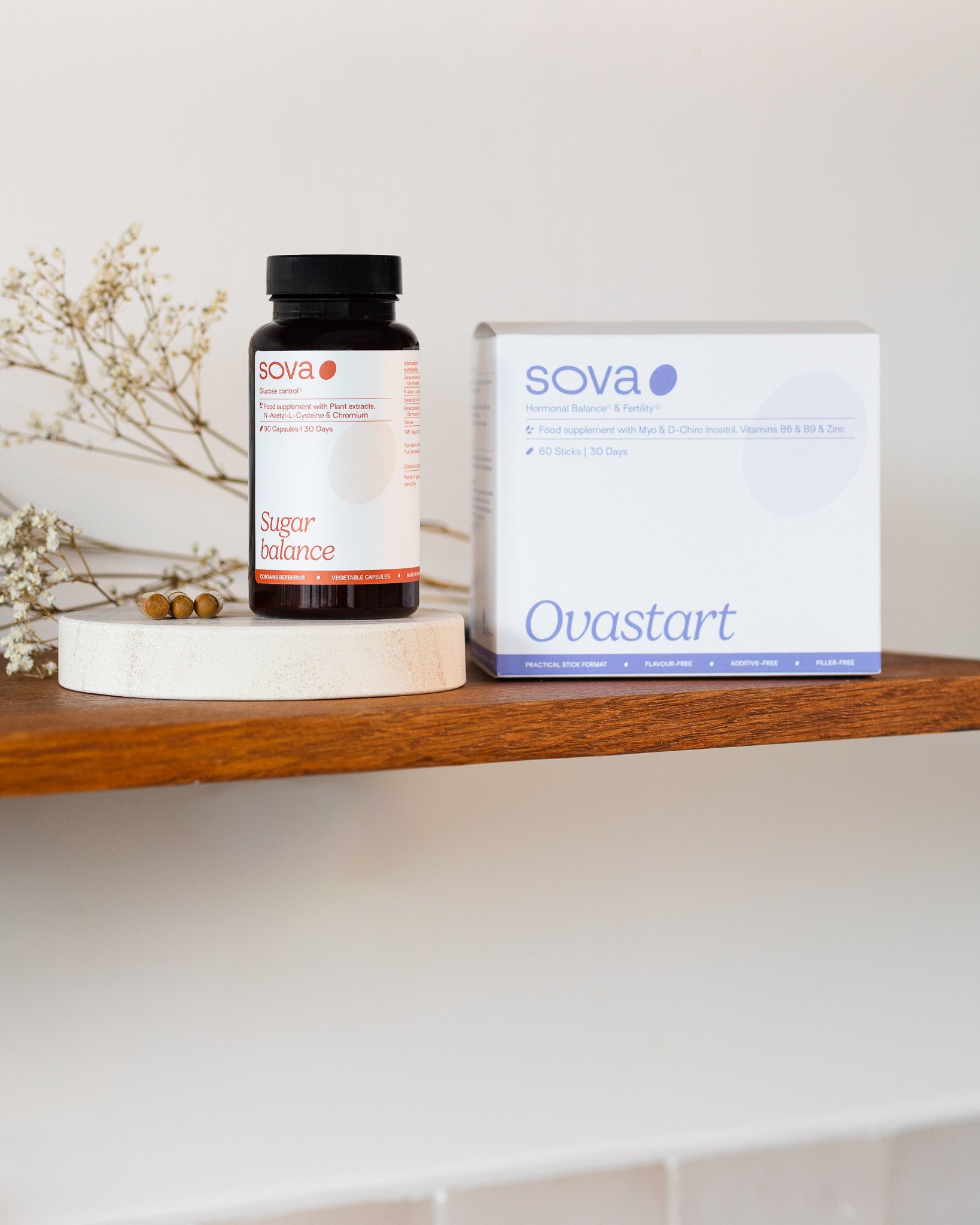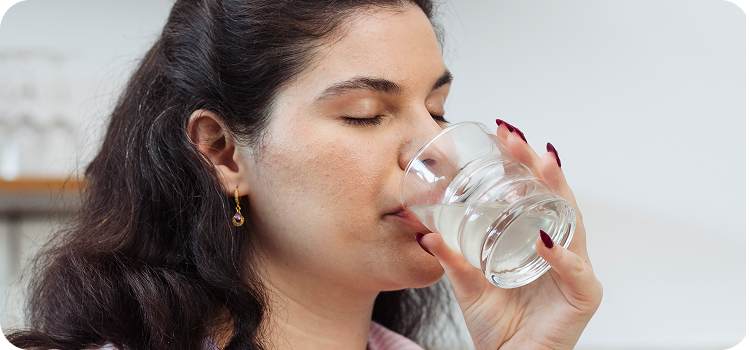Table of contents
PCOS and Fertility – What’s the Link?
If you’ve just been diagnosed with Polycystic Ovary Syndrome (PCOS), it’s normal to have a flood of questions running through your head:
“Will I be able to get pregnant?”
“Does PCOS mean I’m infertile?”
“What exactly is the connection between PCOS and fertility?”
These questions are valid, and you’re far from alone in asking them. The good news? Having PCOS doesn’t mean you can’t have children. In this article, we’ll break things down clearly, explain how PCOS can impact fertility, and share both medical and natural options to support your journey.
Understanding PCOS
Around 1 in 10 women in the UK are affected by PCOS, a hormonal condition that can make menstrual cycles unpredictable. It’s linked to higher levels of androgens (male hormones) and the presence of multiple immature follicles on the ovaries.
These follicles are sometimes referred to as “cysts,” but that’s not accurate – the real issue is the hormonal imbalance that disrupts ovulation and can lead to irregular or absent periods.
Common signs of PCOS include:
-
Irregular or absent periods
-
Acne, excess hair growth, or hair loss
-
Weight gain or difficulty losing weight
-
Insulin resistance and increased risk of type 2 diabetes
-
Fatigue and headaches
👉 Read more about the signs and diagnosis of PCOS here
How does PCOS affect fertility?
First things first: having PCOS does not mean you’re infertile – and definitely not sterile. Infertility simply means having more difficulty conceiving, but it doesn’t mean it’s impossible.
Here’s why PCOS can sometimes affect fertility:
Ovulation issues
In women with PCOS, follicles often don’t mature properly, meaning ovulation may not occur regularly. Without ovulation, it becomes harder to conceive.
Insulin resistance
Up to 70% of women with PCOS experience insulin resistance, which can worsen hormonal imbalances and disrupt ovulation further.
Endometrial receptivity
Some studies suggest PCOS may affect how well the lining of the womb (endometrium) prepares for embryo implantation, making conception trickier.
💛 The positive news? With the right support, PCOS-related infertility is far from permanent – and many women with PCOS go on to have healthy pregnancies.

Can you get pregnant naturally with PCOS?
Yes – many women with PCOS conceive naturally, even with irregular cycles. Research has shown that around 74% of women with PCOS do eventually get pregnant without assisted treatments.
Lifestyle adjustments and targeted supplements can make a big difference by supporting ovulation and improving egg quality.
👉 Read our article on PCOS and missing periods for more on cycle regulation.
Medical Options for Fertility with PCOS
When lifestyle and supplements aren’t enough, doctors may suggest:
-
Ovulation induction with medication
-
IVF (in vitro fertilisation) – PCOS women often have similar or even higher success rates compared to women without PCOS
-
Ovarian drilling (a surgical procedure used in specific cases)
But assisted reproduction isn’t always necessary – many women conceive with more gentle approaches first.
Natural ways to support fertility with PCOS
If you’re starting to plan for pregnancy, here are key lifestyle and nutrition strategies that can help:
Balanced nutrition
A Mediterranean-style diet (rich in vegetables, fruits, whole grains, legumes, oily fish, and olive oil) can help reduce inflammation and stabilise blood sugar.
👉 Check out our article on PCOS and diet

Exercise
Regular movement reduces insulin resistance and helps regulate hormones. Choose an activity you enjoy, whether it’s yoga, running, or dancing.
👉 Read our article dedicated to sport and PCOS
Stress management
Chronic stress impacts hormones like progesterone and can worsen PCOS symptoms. Mindfulness, journaling, or gentle exercise can help break the cycle.
👉 Discover our guide to managing stress with PCOS
Reducing endocrine disruptors
Switching to glass food containers, natural cleaning products, and organic skincare can reduce exposure to hormone-disrupting chemicals.
Supplements to support fertility
Certain micronutrients and active ingredients are particularly helpful for women with PCOS trying to conceive:
-
Inositol (Myo-inositol & D-Chiro-inositol) – supports insulin sensitivity, promotes ovulation, and helps regulate cycles.
-
Vitamin D – important for hormonal balance, egg quality, and implantation.
-
B vitamins (especially B6 and methylated folate/B9) – support hormone regulation and early pregnancy.
-
Omega-3 fatty acids – support egg quality and reduce inflammation.
🌿 At SOVA, our Ovastart supplement combines inositol, zinc, and B-vitamins to support cycle regulation, ovulation, and energy – specifically designed for women with PCOS.
And if you’re looking for extra hormonal balance, our Balance Bundle pairs Ovastart with Sugar Balance, which contains berberine to support insulin sensitivity.
👉 Not sure what’s right for you? Take our PCOS product quiz for a personalised recommendation.
Final Thoughts
The relationship between PCOS and fertility can feel overwhelming at first, but here’s the key takeaway: PCOS does not mean you can’t get pregnant.
With lifestyle changes, the right supplements, and medical support if needed, many women with PCOS go on to conceive naturally and healthily.
It’s a journey that requires patience, self-compassion, and support – and you don’t have to walk it alone. At SOVA, we’re here to help you every step of the way. 💛
SOVA was created by two sisters with PCOS who wanted products that truly worked. Our formulas are developed in-house with women’s health and micronutrition experts, using ingredients backed by clinical studies and compliant with European regulations.
- Built by women with PCOS, we know the reality of the symptoms.
- Clinically studied, high-quality ingredients, including patented forms like Quatrefolic® and an optimal Myo-/D-Chiro Inositol ratio.
- Holistic support for hormonal balance, metabolic health, inflammation, mood and cycle regulation.
- Transparent, science-led formulas with no unnecessary additives.















